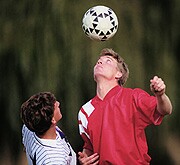- Double Mastectomy May Offer No Survival Benefit to Women With Breast Cancer
- Toxic Lead Found in Cinnamon Product, FDA Says
- Certain Abbott Blood Sugar Monitors May Give Incorrect Readings
- Athletes Can Expect High Ozone, Pollen Counts for Paris Olympics
- Fake Oxycontin Pills Widespread and Potentially Deadly: Report
- Shingles Vaccine Could Lower Dementia Risk
- Your Odds for Accidental Gun Death Rise Greatly in Certain States
- Kids From Poorer Families Less Likely to Survive Cancer
- Tough Workouts Won’t Trigger Cardiac Arrest in Folks With Long QT Syndrome
- At-Home Colon Cancer Test Can Save Lives
Concussion Symptoms May Not Differ in Teen, Young Adult Athletes


TUESDAY, Sept. 24Whether injured athletes are teens or young adults does not affect the severity of their concussion symptoms, according to a new study. However, differences may still exist in the concussion’s aftermath, the researchers say.
Some previous research has raised concerns that high school-age athletes may suffer more severe symptoms after a concussion than college-age athletes, but this study found no evidence of that.
Related symptoms include headache, dizziness, nausea, fatigue, irritability, sleeping difficulties and problems with memory and concentration.
Vanderbilt University School of Medicine researchers compared concussion symptoms in 92 athletes aged 13 to 16 with those of 92 athletes aged 18 to 22. Both groups had 56 percent females and 44 percent males.
No significant differences occurred between the two groups in the number, duration or severity of concussion symptoms, according to the study published online Sept. 24 in the Journal of Neurosurgery: Pediatrics.
Some age-related differences may occur after sports-related concussion, the researchers said. They noted that previous research from the Vanderbilt Sports Concussion Center concluded that age-related differences exist in neurocognitive testing after sports-related concussion.
In evaluating sports-related concussion, it’s important to separate different ways of assessing outcomes, study co-author Dr. Scott Zuckerman said in a journal news release. These methods include assessing symptoms, neurocognitive testing, balance problems, school performance and others.
“It appears that symptoms may not be a prominent driver when assessing outcomes of younger versus older athletes. We hope that our study can add insight into the evaluation of youth athletes after sports-related concussion,” Zuckerman said in the news release.
The author of an accompanying editorial, Dr. Ann-Christine Duhaime, noted that definitions of concussion are not uniform, its diagnosis is not standardized and it’s extremely difficult to match all variable factors in a study of sports-related concussion in different age groups.
More information
The American Academy of Family Physicians has more about concussion.
Source: HealthDay
Copyright © 2024 HealthDay. All rights reserved.










